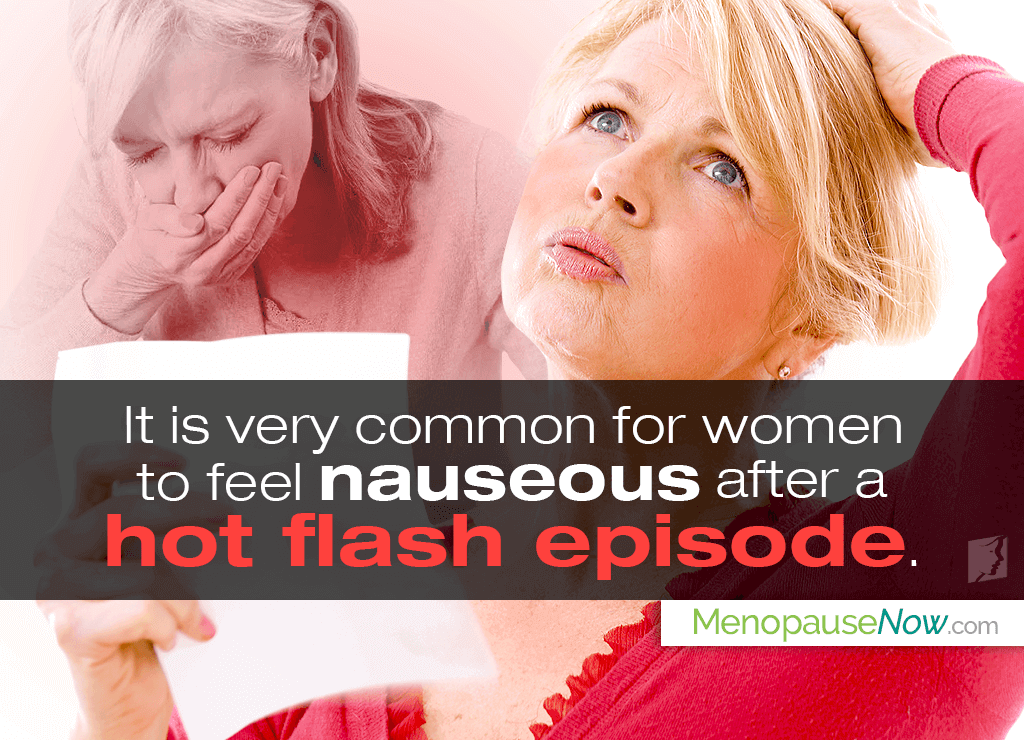Hot flashes are one of the most common and emblematic symptoms of menopause, affecting up to 80 percent of women who are transitioning out of their fertile years.1 While the severity of hot flashes varies among women, as does the duration and frequency of episodes, the symptoms are usually similar and can include feeling nauseous and sweaty, among others.
Continue reading to discover answers to your commonly asked questions regarding getting hot flashes and feeling nauseous afterwards.
Is Nausea a Symptom of Hot Flashes?
Yes, nausea is a common symptom of hot flashes along with other major symptoms like intense feelings of heat; rapid heartbeat; flushing of the face and upper body; perspiration; weakness; dizziness; anxiety; headaches; and cold chills.
Any of the aforementioned symptoms can occur before, during or after a hot flash, including nausea.
Why Am I Experiencing Nausea Following a Hot Flash?
Suddenly feeling hot and nauseous with a hot flash is believed to be due to abrupt changes in serotonin, which can stimulate the area postrema, a part of the brain that controls nausea and vomiting.
Area postrema is located right next to the hypothalamus, the part of the brain that regulates temperature. Due to hormonal fluctuations, the hypothalamus incorrectly detects that the body is overheating, and heat loss mechanisms are triggered, provoking a hot flash.
Is There Anything I Can Do to Stop Hot Flashes and Nausea?
Fortunately, women can reduce hot flashes and nausea by taking steps to rebalance their hormones. Making lifestyle changes, such as the ones laid out here, is a good first initiative:
- Eat a healthy and well-balanced diet rich in phytoestrogens, plant-based estrogens
- Maintain an adequate intake of vitamins E and B
- Practice slow, diaphragmatic breathing
- Exercise for at least half an hour each day
- Take a yoga class or consider meditation for stress relief
- Minimize triggers of hot flashes, including spicy foods, hot environments, caffeine, and constrictive clothing
Recommendations
Consider the implementation of alternative treatments for hot flashes, which promote overall endocrine system health to not only combat hot flashes, but also other pesky symptoms of this life transition. Talk to your doctor about the best action plan for a more refreshing you.
Sources
- Breastcancer.org. (2019). Hot Flashes. Retrieved October 23, 2019, from https://www.breastcancer.org/treatment/side_effects/hot_flashes
- Fred Hutchinson Cancer Research Center Survivorship Program. (n.d.). Menopausal Symptoms. Retrieved October 23, 2019, from https://www.fredhutch.org/content/dam/public/Treatment-Suport/survivorship/Healthy-Links/Menopausal%20Symptoms.pdf
- MacDougall, M.R. & Sharma, S. (2019). Physiology, Chemoreceptor Trigger Zone. Retrieved October 23, 2019, from https://www.ncbi.nlm.nih.gov/books/NBK537133/
- Our Bodies Ourselves. (2011). Hot Flashes and Night Sweats. Retrieved October 23, 2019, from https://www.ourbodiesourselves.org/book-excerpts/health-article/hot-flashes-night-sweats/
Footnotes:
- Harvard Health Publishing. (2015). Menopause-related hot flashes and night sweats can last for years. Retrieved October 23, 2019, from https://www.health.harvard.edu/blog/menopause-related-hot-flashes-night-sweats-can-last-years-201502237745




